When the Guardian asked community journalists in three of Rio de Janeiro’s biggest favelas to start a year-long diary last August, few could have predicted just how tumultuous the following 12 months would prove for their city and Brazil.
The idea was for the young reporters – Daiene Mendes in Alemão, Michel Silva in Rocinha and Thaís Cavalcante in Maré – to record life in their communities as the city geared up to host the 2016 Olympics and Paralympics – an event that has brought R$39.1bn (£9.1bn) in spending, but also far more police activity.
Many of their entries – extracted below – are filled with tension and violence as they describe being woken by police helicopters and going to sleep with the sound of shooting outside their homes. The number of killings is worse than some war zones. All too often, they write, the police are to blame.
Some of their views are contentious. For their own safety, the three reporters are limited in their ability to touch on the subject of the drug-trafficking gangs that still dominate their communities. Public security authorities dispute their claims that police pacification units (UPPs) in Alemão and Rocinha, and increased operations in Maré (which has no UPP) have led to more violence. Many academics believe the situation in Rio would be worse if police resources were only used to protect rich neighbourhoods. The city government says it has improved the lives of favela residents by building more roads, upgrading public transport and opening more schools and clinics.
But such benefits – which vary enormously from place to place – are overshadowed by conflict, which the diarists believe has worsened with the upcoming Olympics. They have also had to deal with the Zika outbreak, recession, government budget cuts, the impeachment of president Dilma Rousseff and (in Rocinha) mudslides.
By any measure, it has been an extraordinary year. But, what also comes through in the diaries is how residents in the favelas get on with their lives, celebrate festivals, share achievements and support one another. The Olympics and the police, it seems, merely get in the way. Jonathan Watts
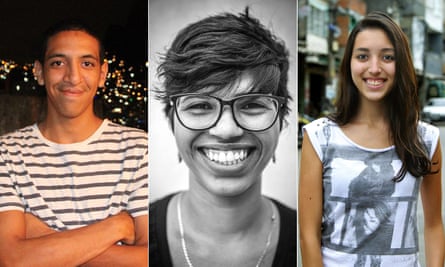
21 August 2015 – Rocinha
A teenage resident is killed today during a shootout between drug traffickers and police. It barely makes the news. Rio de Janeiro is more focused on the Olympic test events in the richer areas of the city. Shootouts and killings in favelas are rarely reported. There are many clashes between police and gangs. When two armed powers operate in the same territory, confrontation is inevitable.
23 September – Maré
My bus home is stopped by a protest. I don’t discover the cause until I arrive home. Hours earlier, 11-year-old Herinaldo Vinícius de Santana was fatally shot in the head on the way to buy a ping-pong ball. He is the second young victim this month in Maré. According to data released by Amnesty International, more than half of registered killings by on-duty police in Rio de Janeiro between 2010 and 2013 were of young people between the ages of 15 and 29. Of those killed, 79% were black.
30 September – Alemão
At 10am, a young man, 20-year-old Deyverson Avelino, is shot dead in the Canitar neighbourhood of Alemão. The favela is flooded with police. Residents say Avelino died on the spot, but police claim he succumbed to his wounds at the emergency care unit. Sometimes the police lie. There have been times when I have seen something happen, then requested a press release from the police, who have provided a completely different story.
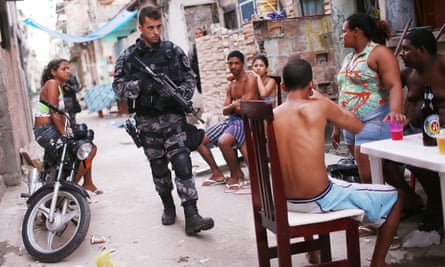
31 October – Alemão
The NGO Voice of the Community, which I used to work for, holds a festival for children in Alemão’s Olympic Village, a large sports complex. The event lights up the community with the smiles of hundreds of local kids. It is a lot of fun. In the evening, the police hand out baskets of basic necessities in the Alvorada neighbourhood. It is an attempt to win over the residents. The gangs used to provide this service so now the police have sort of taken over the task.
17 October – Rocinha
Rocinha is very tense after the shooting of two young men in the favela in less than 24 hours. One of the injured, Adson da Conceição Figueiredo, 24, was shot by police during a raid. The other, whose identity was never revealed, was shot while hiking from Rocinha to Chacara do Céu in Leblon. Angry residents block a highway in protest and the UPP commander requests reinforcement to control the situation. Police use teargas, pepper spray and rifle fire to suppress the demonstration.
24 October – Alemão
Commerce in Alemão is ordered to shut down after police kill a drug-trafficking gang member, 26-year-old Paulo Ricardo da Silva, known as PL or Polho. The gang insists all shops close to mourn him.
2 December – Rocinha
A pregnant woman has to be rescued from a landslide in the Trampolim neighbourhood of Rocinha after a thunderstorm hits our community. Storms are always a concern because people build houses on slopes where the ground is not stable. Construction is supposed to be prohibited, but everyone knows the authorities won’t do anything.
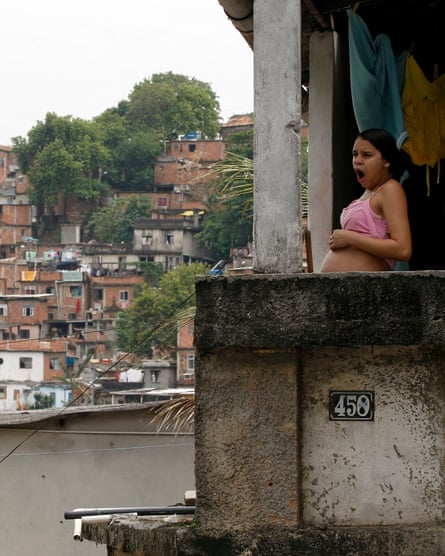
5 December – Maré
There is growing concern about the Zika virus in the news. It seems to hit favelas hardest. In Maré, I’ve seen at least six people who have been infected. I am one of them. Often, when we get sick, doctors at public hospitals will not see us because they are not being paid their salaries. And when they prescribe medicines, we are left to pay for them. I had to go home and wait until I got better. The reports say it can cause problems in foetuses, but we don’t have enough information. I don’t plan to get pregnant any time soon but, if I do, I will worry whether my baby will be born healthy.
6 December – Rocinha
Tour operators treat favelas like zoos, but that might end soon. A motion to reform the “safari trips” through favelas was tabled in the municipal government today by councillor Célio Lupparelli, who says the visits are arranged by companies from outside the favela who pay little heed to the cultural, historical and artistic aspects of our community. Instead, tourists just focus on degradation, poverty, violence and misery and leave without any interaction with local culture.
13 December – Rocinha
Rocinha social networks were buzzing today with a community appeal to raise money for a family who lost everything in a fire. It is often the case that the community fills the gap left by social services. If we waited for the authorities, it would take too long because of the bureaucracy involved.
25 December – Rocinha
Instead of Christmas cheer, there was fear in Rocinha after a shootout between police and locals that left one dead and six injured. Jorge Arui, a 49-year-old merchant, was killed on his way to the shops to buy bread. Locals said the gunfight started after the police demanded music from a party be turned off.
2 January 2016 – Alemão
It’s 5.40pm and I hear shots nearby. Over time, your ears grow accustomed. The volume and crack tell you how far you are from the gunfire and whether it is from a powerful weapon. I would rather not learn these things, but it is not a matter of choice: it is a question of survival. My ears are used to it, but my heart is not. The closer the shots, the stronger it beats. Each time, the symptoms are the same: pounding heart, cold trembling hands, eyes wide open and all senses on alert.
19 January – Maré
The construction of the Factory of Tomorrow School – a municipal educational project – is underway. It has been a long time since the authorities invested so much time and money in our children. The promises came only after they announced the World Cup and Olympics. It will be good to have more schools in Maré – but it’s frustrating that our demands are not met without political motivations.
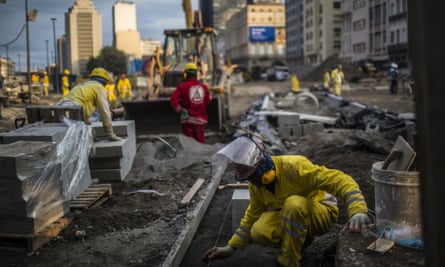
23 January – Maré
The community is full of energy today as we celebrated summer in Maré with a pre-carnival street party. Our goal is to have this event recognised as one of the city’s blocos or neighbourhood parades. Everyone met at the Lona Cultural, a hub for music and other events, in the heat of the afternoon and then we sweatily partied our way towards the Pontilhão at night. This is an area that was taken over by the military but today we occupied it with dancing and festivity. The drummers kept up a strong rhythm, people painted their faces, mothers in brightly coloured clothes brought their young children along. We will have other blocos at the Pontilhão. The police put their armoured cars there, but we bring baile funk and go to play at the nearby amusement parks and skating rinks. I think it’s important to occupy these areas as a form of resistance.
29 January – Rocinha
My sister, Monique, witnessed a shooting and robbery inside the Rebouças tunnel, which links the north and south zones of Rio. According to the military police, a motorbike was stolen and the victim was shot twice in the arm. The incident caused panic. Drivers feared it was a mass robbery and abandoned their cars to run outside the tunnel. There is a frightening climate of fear in this city. People head off to work each morning, not knowing whether they will return home in the evening.
9 February – Alemão
I go to a carnival party in Inhaúma, which ends in chaos at 2am when police try to drive through the crowd to turn off the sound. Locals throw beer bottles. Police respond with shots and stun grenades. For more than 30 years, the state had not been present in Rio’s favelas, and now it is mostly represented by military police. The police can’t be the solution because they are protagonists and lack legitimacy.
22 February – Maré
Today, I have one of the worst experiences I can remember. On my way to college, I am almost caught up in fighting during a police action. I take shelter behind a car and cover my ears. The gunfire is very loud. So is my crying. I drop my food and go to college in a state of shock. When I return home, there are empty rounds of ammunition on the floor. The news reports that 19-year-old resident, Igor Silva, 19, was fatally shot in the chest by an officer from the core special police unit. He worked at a local pharmacy, but the police insist he is a criminal. This is a day that makes me rethink my life.
8 March – Alemão
Last night, there was such a fierce gun battle that I could not go home. My WhatsApp groups warned of the tension in the favela, so a friend offered to let me stay at her house.

12 March – Rocinha
Heavy rain turns the community into a river. That’s not news. It is always like this in a storm. One resident – 58-year-old Carlos M da Silva – dies after being dragged into a ditch. When it rains, the volume of water and garbage that comes down the hillside is huge. Residents say Carlos was trying to unclog a manhole and was carried by the force of the current and debris. He was a street cleaner and worked clearing ditches. He died trying to help the community, as he had always done.
23 March – Maré
The country’s economic crisis is affecting many sectors of society. Teachers are on strike because of their low salaries. This has gone on for so many months that students have occupied more than 30 public schools to stake a claim to a better education. They sleep in the classrooms. My old high school where many Maré residents have studied – the Viscount of Cairo College – is one of the occupied schools.
17 April – Maré
A very important day for the country – the lower house votes on the impeachment of president Dilma Rousseff. We are experiencing a coup. There are protests across the country, but Maré does not raise its voice. We have not forgotten that the president approved the military occupation of all the favelas of Maré in 2014.
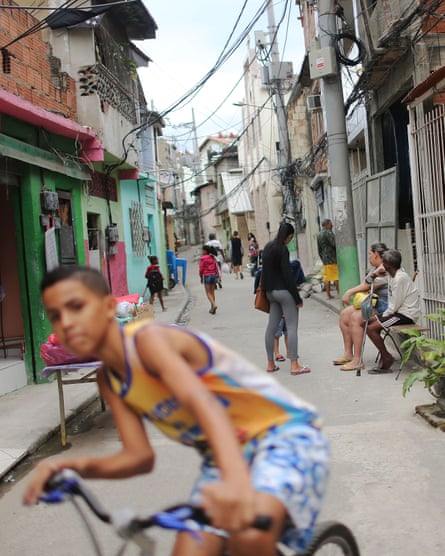
21 April – Rocinha
A newly built cycle lane collapses after being hit by a strong wave. Among the fatalities is a 60-year-old Rocinha resident, Ronaldo Severino da Silva, who used to go for walks along that cycle path on his days off. The construction, which was inaugurated in January, cost R$44m (£10m) but failed to account for the impact of waves. This is absurd because it was built on the coast. But it is not an isolated accident – Rio is full of botched work.
7 May – Rocinha
The Olympic committee hosts a one-day festival in the Rocinha sports complex, from 8am to 1pm, where people can try out popular and unusual sports and children can pose next to the Olympic and Paralympic mascots. There wasn’t much information about the event, and not many people come. It is the first time the mascots visited Rocinha. Until now, there hasn’t been any legacy for the community. Just marketing.
12 May – Maré
On the way home from my sister’s house, I hear shots ahead of me. I call my mother to check whether it is safe to return. Later, I learn that a core special police unit has killed a local resident – 24-year-old Oswaldo Rocha. This time, the lethal shooting doesn’t even make the newspapers. Violence in the favela has become trivialised. People have a new topic of discussion when they chat at bus stops and in checkout queues and lifts: Rousseff has been removed from the presidency. And who will lose most from this? As always, it will be us. The vice-president, Michel Temer, who has taken over, has promised to reduce workers’ rights. I’m worried about what will come next.
17 May – Rocinha
The extension of Metro Line 4, which will finally give Rocinha residents a subway station, has been delayed – and when it does open, we will not initially be allowed to use it because priority will be given to Olympic pass holders, including athletes, organisers and tourists.
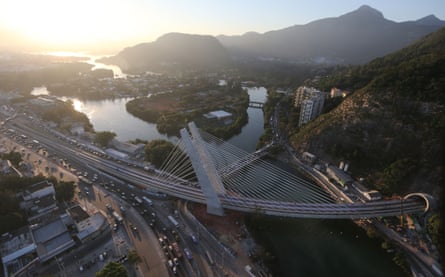
10 June – Rocinha
A court has awarded damages to the family of Amarildo de Souza, a Rocinha resident who was tortured and killed by military police in July 2013. About a dozen officers have been convicted for the case, which was a turning point in relations between the UPP police unit and the community. Since de Souza’s death, the UPP has lost credibility with the locals. The number of police officers has been reduced and the level of violence has increased. I used to think the UPP programme was good but, over the years, I have come to feel cheated. There is no point investing in security if there is a lack of other basic public services such as health, leisure and education.
19 June – Alemão
On TV, I follow the Olympic torch passing through several cities of Brazil. Nearer home, there is a major confrontation. Police are everywhere. I cannot leave the house – the shots are too close. Instead, I wait. Another resident, 31-year-old Roseli Jesus, has a different fate: she is shot in the back and dies instantly. Another local, 19-year-old Luiz Felipe Alves, has to be hospitalised.
Ahead of the Olympics, police operations have become more intense. More people are dying. That could be my family, my friends, maybe even me.
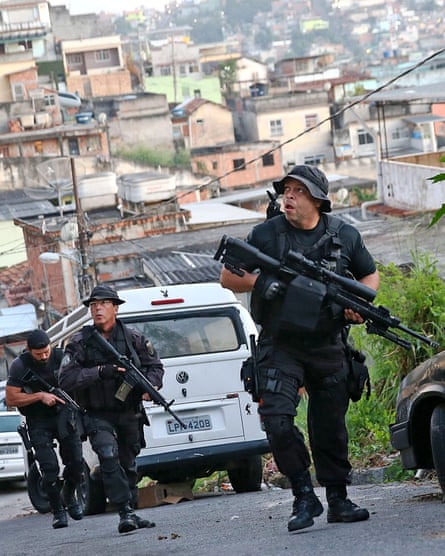
22 June – Alemão
A distressing day. I’m outside the favela, but my phone buzzes with messages throughout the day as people simultaneously report hearing shots at various locations. I don’t know how to return home. One resident, Isabel Martins, is hit by a bullet in the Alvorada community. It wounds her arm. In a shootout in my own neighbourhood of Nova Brasilia, a police officer is struck in the thigh. Given the terrible situation, the best response from the government would be to remove police from Alemão. The UPP has not worked. We want police who respect us as citizens.
24 June – Maré
Today is the birthday of my older sister. We have spent the past week organizing a surprise party, but it proves difficult. We wake at 5am to the sound of shots. Live television coverage shows three armoured vehicles patrolling the neighbourhood. Amid all this uncertainty, my family decides to go ahead with the party. Outside, three men lose their lives. They are shot a short distance away from the house where we are. It is really sad to celebrate life amid so much death. But this is our way to resist.
29 June – Maré
I go to sleep hearing gunshots and then I wake with them. This is becoming routine. BOPE special police forces have entered three Maré favelas. I have good news today – I have passed a college exam. But any joy I feel quickly fades when I receive a call from my mother telling me to be careful on the way home from work. I spend the rest of the day fearing that something might happen to my family and friends. I want to cry.
The police operation lasts more than six hours. It seems a police officer is shot. So is a bricklayer’s assistant, José da Silva, who is killed by stray bullet. A hospital worker, Carmen dos Santos, is hit in the arm.
30 June – Rocinha
Until 2014, favelas were almost invisible on the internet, which fed the stigmatising of our communities. But now, with the help of local NGO AfroReggae, Google has mapped streets, alleys and 3,000 businesses in 25 communities. This year, it aims to increase that by 25% with the help of community residents trained in digital cartography. Another digital-mapping initiative has been launched by the community newspaper Foreign Roca in partnership with the Memory and History Museum of Sankofa. According to the organisers, mapping is a way for the favela to assert its place in the city.
1 July – Alemão
I am woken at 7am by shots that sound very close. The noise echoes through my little house. At times like this, I think about leaving Alemão, although I love living here.
On days when there is shooting, the whole routine of the favela changes. The climate of tension makes it difficult for people to return home and even the mototaxis stop working. That means there is less trade and less money for many families. A single bullet can impact the routine of 120,000 residents here.
12 July – Maré
After foreign visitors arrive for the Olympics, they will have to drive from the airport past the colourful murals on temporary barriers that hide our favela. Maré residents have nicknamed this the “wall of shame”. It was erected a few years before the 2014 World Cup. Officials say the barrier is acoustic and reduces the noise of cars. I believe that is a lie. I think they are attempting to deny our existence, which is revolting.

1 August –
Daiene Mendes in Alemão
Over the past 48 days, I have counted at least 25 days of gunfights, two residents have died, and another five, including two police, have been injured. Alemão was better off in the past when it was abandoned by the state. Now, I believe the state looks at us with the eyes of an assassin.
I hope the Olympic Games is over soon because the only legacy I see is repression, militarisation and war.
Thaís Cavalcante in Maré
In the past year, the situation in Maré has become more intense than in previous years and everything indicates that this is because of preparations for the Olympics. On the one hand, there have been countless police operations. On the other, there has been more public investment in local culture. Community journalists have had the opportunity to tell the residents’ side of the favela story, yet the commercial media continues to blacken the name of our communities.
Michel Silva in Rocinha
There is a new subway station near our community, but this should have been built long ago. Apart from that, there may be a short-term boost from tourism. But what happens after the Olympics? Many of the subway construction workers are from Rocinha. Now the project has almost ended, they have been laid off. The building workers union estimates 30,000 people will lose their jobs. Meanwhile, the shootings continue. Over the past year, five residents have been killed and 14 wounded in shootings or violence. The government is trying to make the city seem safe for international visitors, but it is not safe for residents. I am glad the Olympics lasts only 17 days. After that, we need time to put our house in order.
Comments (…)
Sign in or create your Guardian account to join the discussion